Studies show that an estimated 51.6 million American adults experience chronic pain—or over 20% of the adult population. (1) It will likely come as no surprise that this pain can torpedo sleep quality, setting up a nasty cycle. (2) Whether you’re dealing with chronic pain, recovering from an injury, leading an active lifestyle, or getting up in your years, a mattress designed specifically for back and joint support can go a long way. While the primary function of any mattress is support, orthopedic mattresses take things a step further.
According to Dr. Raj Dasgupta, an ABIM quadruple board-certified physician specializing in internal medicine, pulmonology, critical care, and sleep medicine and the chief medical advisor for Fortune Recommends™ Health, orthopedic mattresses help keep your spine in alignment to prevent pressure buildup and pain, while also cushioning joints and other sensitive areas. Typically, this is accomplished with zoned support that is firmer in the center third of the bed and softer towards the head and foot. Orthopedic mattresses may also offer superior pressure relief by evenly distributing the body’s weight, which keeps pressure from building in the parts of the body that come into contact with the surface of the mattress.
Any company can describe their mattresses as orthopedic, so knowing what to look for is an essential first step. In addition to offering zoned support and promising pressure relief, the right orthopedic mattress must meet personal sleep needs, such as your body type and favored sleep position. We tested some of the best mattresses on the market to find the standouts for these features, and we included various options, from material to construction to price. Below, find our recommendations for the best orthopedic mattresses to ease joint pain for more comfortable nights and mornings.
Best orthopedic mattress overall
With its adaptive memory foam layers and medium-firm feel, the Nectar Classic is our pick of the best orthopedic mattress overall. Its foam-on-foam construction can evenly distribute body weight to relieve pressure, and our testers reported comfortable head-to-toe support. We also like the mattress’s generous 365-night sleep trial and lifetime warranty. Keep reading to see how else the Nectar addresses joint pain for more comfortable sleep.
Our picks for the best orthopedic mattresses
- Best overall: Nectar Classic
- Best for back pain: Saatva Memory Foam Hybrid
- Best for side sleepers: Helix Midnight
- Best for heavyweight sleepers: Titan Plus
- Best for back sleepers: Bear Elite Hybrid
- Best for stomach sleepers: Saatva Hybrid
Compare orthopedic mattresses
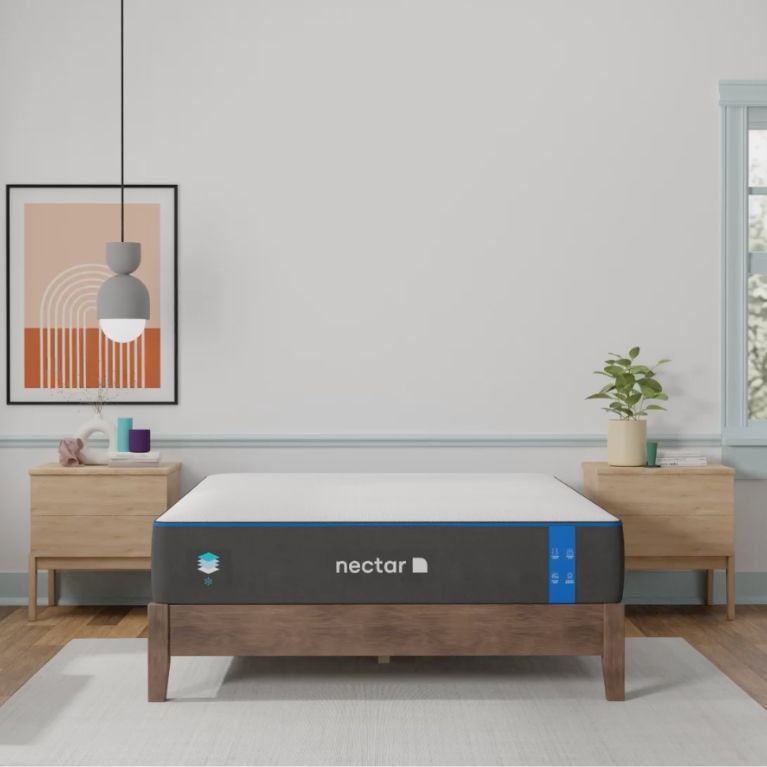
|
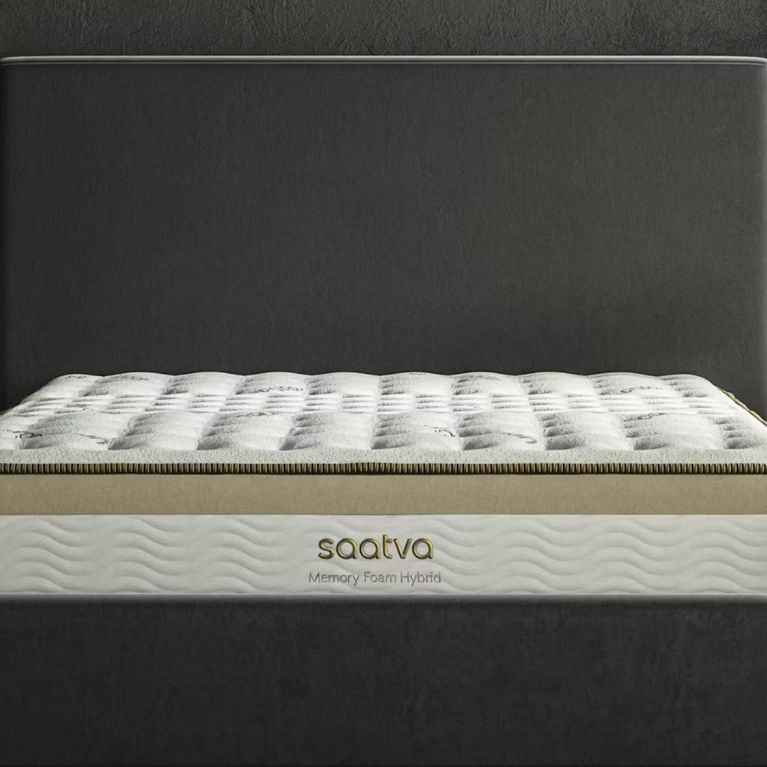
|
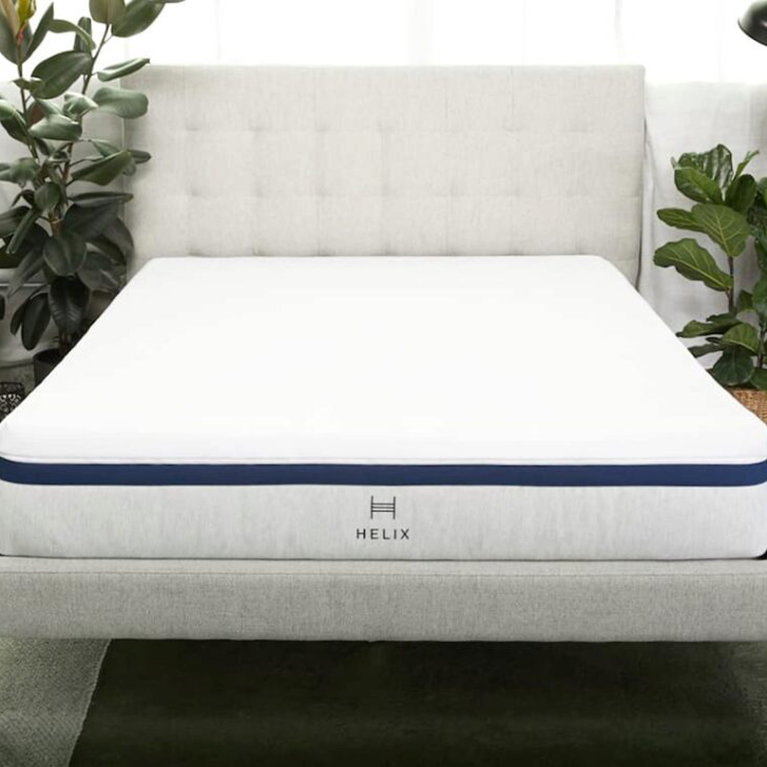
|
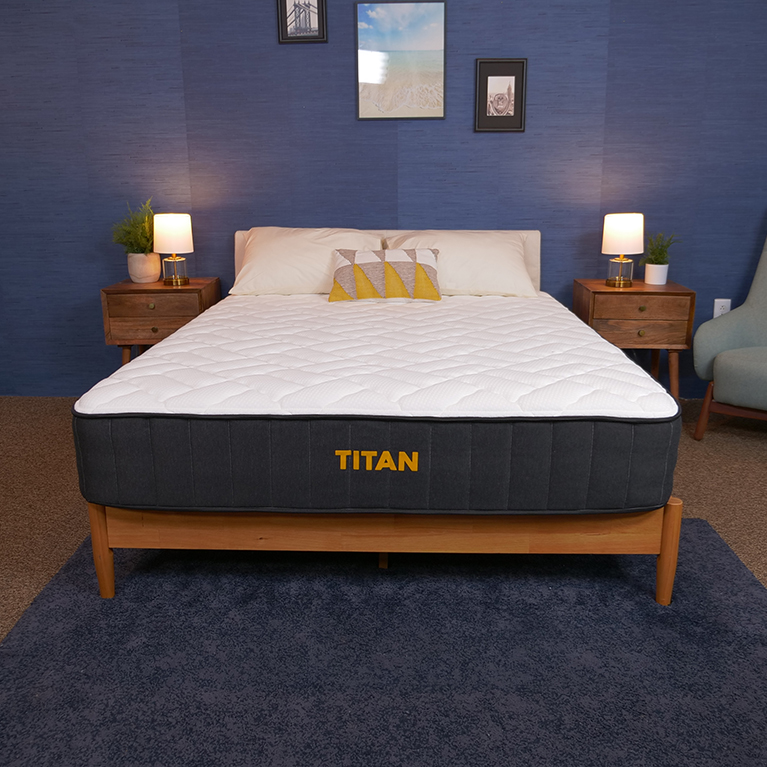
|
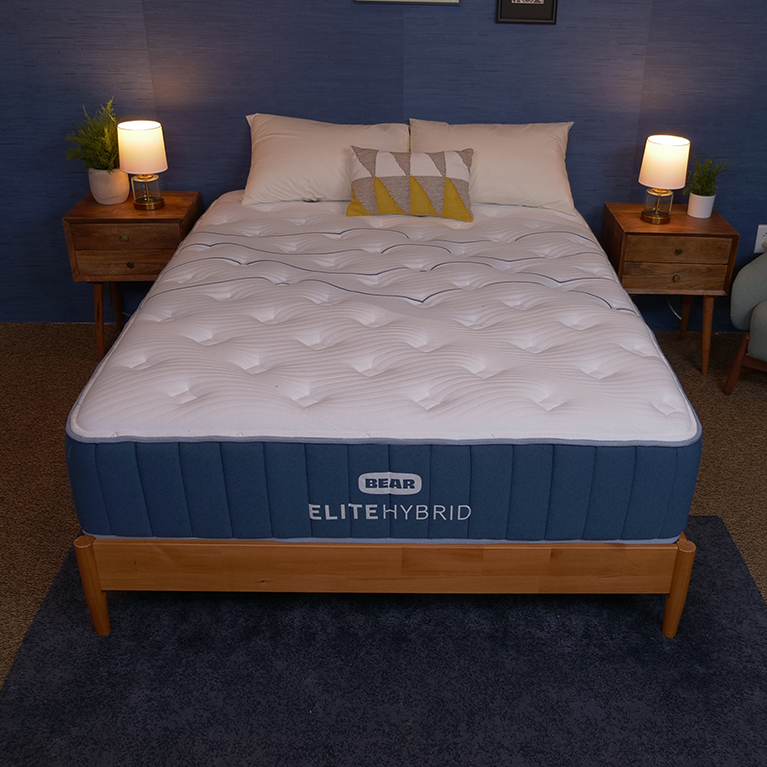
|
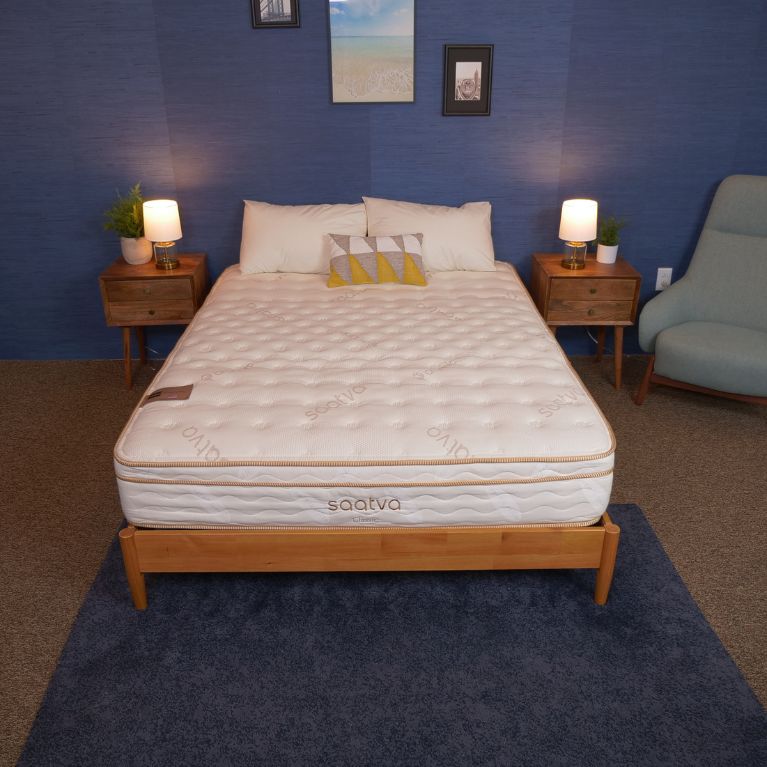
|
|
| Nectar Classic | Saatva Memory Foam Hybrid | Helix Midnight | Titan Plus | Bear Elite Hybrid | Saatva Classic | |
| Rating | ||||||
| Best for | Overall | Back pain | Side sleepers | Heavyweight sleepers | Back sleepers | Stomach sleepers |
| Price | $1,387 | $1,845 | $1,332 | $1,249 | $2,305 | $2,095 |
| Material | Memory foam | Hybrid (foam and coils) | Hybrid (foam and coils) | Hybrid (foam and coils) | Hybrid (foam and coils) | Hybrid (foam and coils) |
| Trial Period | 365 nights | 365 nights | 100 nights | 120 nights | 120 nights | 365 nights |
Best overall orthopedic mattress: Nectar Classic
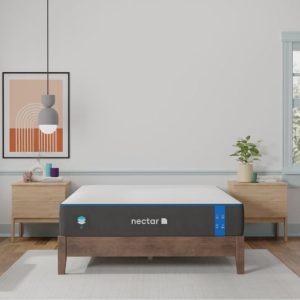

Key product features
What you should know
With its foam-on-foam design, the Nectar Classic conforms to the body’s curves to distribute weight and ease pressure that can contribute to joint and back pain. While it has a soft, cushioning feel, the dense base below adds key support for spinal alignment.
- Our testers reported feeling very supported on the Nectar, while its foam offered ample cushioning around joints.
- The flagship Nectar mattress is the brand’s most budget-friendly buy. On sale, a queen mattress costs just under $649, which is low compared to competitors.
- Its medium-firm feel makes it a good pick for many sleepers, though our testers report feeling most comfortable on their side and back.
Why we like the Nectar Classic as best orthopedic mattress overall
The Nectar Classic isn’t advertised as an orthopedic mattress, but according to our testers, it ticks the boxes for support and likely pressure relief. That’s partly due to its gel-infused memory foam layers, which deliver the material’s signature contouring feel in response to heat and pressure. Our testers describe a plush, cushioning feel and noticeable sink that was particularly comfortable for side and back sleeping. Stomach sleepers will likely need a firmer mattress to keep the hips elevated so the spine isn’t pulled out of alignment.
The memory foam in the Nectar has another benefit—motion isolation. Our team says the mattress scored well for this feature, which makes it an excellent pick for couples. The slow-moving foam dampens motion nicely, which means disruptions aren’t overly detected from across the mattress, but it does make changing positions a little challenging. Another downside of the all-foam construction? Edge support isn’t the best. Our testers felt precarious while lying close to the edge but more supported while seated. On the other hand, the mattress’s interior support fared much better. The dynamic foam below the cushioning comfort layer helps support neutral alignment, a key feature in orthopedic mattresses.
Heat retention can be an issue with both memory foam and all-foam mattresses. The Nectar uses gel-infused foam and has a breathable cover, but no active cooling features exist. While our team reports only a five-degree temperature increase after five minutes of lying on the mattress, we wouldn’t necessarily recommend it for hot sleepers.
The Nectar has a single firmness option, but its medium-firm feel is a good fit for many sleepers. Studies have suggested that medium-firm mattresses are good options for promoting comfort, sleep quality, and alignment. (3)
Overall, the Nectar mattress is a solid choice for back and side sleepers searching for an orthopedic mattress, especially those shopping on a budget. The sales price for a queen is $649, which is particularly impressive when you look at the competition. Plus, Nectar runs sales and promotions year-round, making it easy to get the best price.
To learn more about this brand, visit our full Nectar mattress review.
Specs
| Price (queen) | $1,387 |
| Material | Memory foam |
| Firmness | Medium-firm |
| Warranty | Forever Warranty™ |
| Trial | 365 nights |
Best orthopedic mattress for back pain: Saatva Memory Foam Hybrid
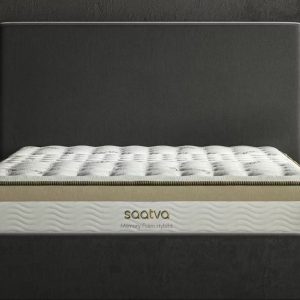

Key product features
What you should know
This Saatva pick combines the pressure-relieving benefits of memory foam with the responsive feel of an innerspring mattress. Enhanced lumbar support and the breathability of coils combat the heat retention for which memory foam is known, making this a great choice for relieving back pain and cooling hot sleepers.
- Patented lumbar zone features mean more support in the center third of the mattress to help ease back pain.
- With a queen priced at $1,845, this mattress falls in the mid-to-high range of the price spectrum.
- A triple cooling system addresses overheating, a common problem with regular memory foam.
- Contouring memory foam helps relieve pressure point pain, while the pocketed coils make it easy to move around.
Why we like the Saatva Memory Foam Hybrid as best for back pain
Enhanced lumbar support is a key feature of orthopedic mattresses, and the Saatva Memory Foam Hybrid delivers in more ways than one. The mattress features more support in the center third of the mattress, thanks to a gel-infused memory foam lumbar crown and what the brand calls its Patented Lumbar Zone® Technology. Together, these support a neutral spine for any sleep position, which is important for keeping back pain at bay.
While memory foam is notorious for heat retention, Saatva’s model has a three-part system for cooler sleep. It starts with gel-infused foam in the memory foam lumbar crown, which draws away excess heat. In the memory foam comfort layer, a wave design creates air pockets that help circulate air, adding to the contouring and pressure-relieving feel. Finally, the coil layer naturally promotes airflow. We think that makes this a great fit for hot sleepers.
The coils are buffered by high-density foam rails to boost edge support, so this mattress works for those who like to maximize their sleep surface or have mobility issues that can make getting in and out of bed challenging. The responsive coils also make it easy to change positions, which is ideal for combination sleepers.
On the downside, that responsiveness means there is some motion transfer, though it’s tempered well by the memory foam. Still, for especially light sleepers, that’s worth keeping in mind. Another potential drawback is the single firmness option. While the medium-firm feel appeals to a wide range of sleepers—and is recommended for those with back pain (4)—sleepers in the lightweight (less than 130 pounds) or heavyweight (more than 250 pounds) category may find this mattress runs too firm or too soft.
Given its features, the Saatva Memory Foam Hybrid offers good value for the money, especially for those looking for an orthopedic mattress that addresses back pain. A queen retails for $1,845, which doesn’t account for sales or promotions, putting the mattress in the mid-to-high range on the pricing spectrum compared to competitors.
For more information, visit our full Saatva mattress review or see the best mattresses for back pain for more options.
Specs
| Price (queen) | $1,845 |
| Material | Hybrid (foam and coils) |
| Firmness | Medium-firm |
| Warranty | Lifetime |
| Trial | 365 nights |
Best orthopedic mattress for side sleepers: Helix Midnight
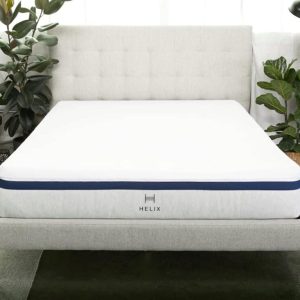

Key product features
What you should know
Side sleepers need soft cushioning around the hips and shoulders and enough support to maintain a neutral spine. The Helix Midnight was designed with those needs in mind. Our testers describe the medium-firm hybrid as a nice balance of softness and firmness, with plenty of support from head to toe.
- Our team found that Midnight’s contouring foams immediately reduced stored pressure in the hips and back.
- As part of Helix’s Core collection, the Midnight is affordably priced—it’s $1,332 for a queen before discounts, but regular sales and promotions often bring that down under $1,000.
- According to our testers, this is an excellent fit for side and back sleepers, and the touch of bounce also accommodates combination sleepers.
- The Midnight has a breathable cover, but hot sleepers can upgrade to the GlacioTex™ Pillow Top for $299.
Why we like the Helix Midnight as best for side sleepers
Between its medium-firm feel, potential for excellent pressure relief, and supportive construction, the Helix Midnight fits the category of orthopedic mattresses—especially for side sleepers. When people sleep on their sides, their shoulders and hips bear the body’s weight, which can lead to pressure at the point where these protruding body parts come into contact with the mattress. That’s why side sleepers need a mattress that’s neither too firm—which contributes to the pressure buildup—nor too soft—which results in a lack of support that allows the spine to slip out of alignment.
The medium-firm Helix Midnight was designed to accommodate side sleepers, and our testers report that it does precisely that. They confirm that the contouring foams are ideally cushioning around the back, shoulders, and hips. For one tester, that meant immediate relief of stored pressure in the back and hips.
Back sleepers may also benefit from sleeping on the Helix Midnight. Our team found the mattress supported pressure relief well in this sleep position. Thanks to a touch of bounce, the Midnight also responds well, making it a good fit for combination sleepers. On the downside, it transfers motion, so couples may have better choices if one partner is a restless sleeper.
While the Midnight does a good job of contouring around joints, it’s less pronounced than memory foam alternatives. That’s partly due to the double layer of responsiveness foam, which pushes back to help maintain an aligned spine. While there are no lumbar zone upgrades to the Midnight, our team scored it well for general body support and credited the durable materials for that.
The coil layer adds to the breathability of the mattress, which comes standard with a Breathe Knit Cover. It doesn’t feel cool to the touch, but we didn’t find that the mattress slept excessively warm. Still, Helix offers a $299 upgrade to the GlacioTex™ Pillow Top, which adds two inches of plush cushioning foam with a cool-to-the-touch cover that actively wicks away body heat. A mattress that keeps you cooler during the night is important for restful sleep because the body’s core temperature must drop to a certain point to produce melatonin, the sleep hormone. (5)
As part of Helix’s Core collection, the Midnight is well-priced at $1,332 for a queen. Plus, Helix has regular sales and promotions that bring the price of the mattress under $1,000.
If this isn’t the right pick for you, see our full guide on the best mattresses for side sleepers for more options. Or, see our full Helix mattress review to learn more.
Specs
| Price (queen) | $1,332 |
| Material | Hybrid (foam and coils) |
| Firmness | Medium |
| Warranty | 10 years |
| Trial | 100 nights |
Best orthopedic mattress for heavyweight sleepers: Titan Plus
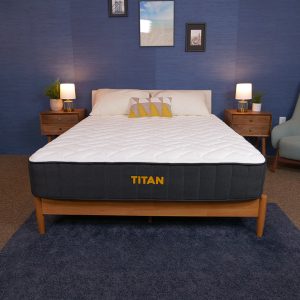

Key product features
What you should know
The Titan Plus is engineered to meet the needs of plus-size sleepers. The mattress can comfortably support up to 1,000 pounds, with a firm feel that can be hard for heavyweight sleepers to find. Our team was impressed by the hybrid’s incredible level of support, thanks to its firm, high-density foam layers.
- Our team reports that the Titan Plus has minimal sinkage and keeps the body lifted and supported.
- Before promotions, the Titan Plus retails for $1,249, which makes it very well-priced considering its material quality and hybrid construction.
- Up to 900 individually encased coils are reinforced to handle more weight while boosting edge support, isolating motion, and adding to the mattress’s overall comfort.
- The Titan Plus has a breathable knit cover, but hot sleepers can upgrade to the cool-to-the-touch GlacioTex™ Cooling Cover starting at $150 for a queen.
Why we like the Titan Plus as best for heavyweight sleepers
People over 250 pounds can experience sinking and sagging in their mattresses, which may lead to compromised support and aches and pains. That’s because many mattresses aren’t designed to accommodate weight capacities over 250 pounds on either side of the mattress.
That’s not the case with the Titan Plus, which is specifically engineered to support more weight—up to 1,000 pounds total. You can thank the mattress’s advanced support system, which comes from higher-density foams and up to 900 individually encased TitanCore coils crafted from steel. For heavyweight sleepers searching for an orthopedic mattress, the Titan Plus delivers the firm support that can be so hard to find in this weight category.
Titan, a Brooklyn Bedding company, gives the Titan Plus a nine on the fitness scale, and our testers agree, describing the mattress as very hard and allowing for no sinkage whatsoever. While that’s ideal for heavyweight back and stomach sleepers looking for standout lumbar support to ease joint pain, our team doesn’t recommend it for strict side sleepers, particularly those closer to 250 pounds. For more pressure relief in this sleep position, the Titan Plus Luxe may be a better choice because of its medium feel and enhanced contouring.
The Titan Plus scored very well for edge support, though our testers reported feeling more supported while seated on the edge than they did lying there. While the mattress has no active cooling features, the breathable cover and hybrid construction promote airflow nicely. Hot sleepers, however, may consider upgrading to the GlacioTex™ Cooling Cover to better manage overheating.
The Titan Plus is packed with upgraded materials to ensure long-term support for heavier sleepers seeking some of the benefits of an orthopedic mattress. Still, the price point remains at the lower end of the spectrum. With frequent promotional pricing, we think it’s an excellent value at roughly $875 with the standard cover and around $980 with the GlacioTex™ Cooling Cover upgrade.
For additional options, see our best mattresses for heavy people roundup. Or, check out our Titan mattress review for more insights on this brand.
Specs
| Price (queen) | $1,249 |
| Material | Hybrid (foam and coils) |
| Firmness | Firm |
| Warranty | 10 years |
| Trial | 120 nights |
Best orthopedic mattress for back sleepers: Bear Elite Hybrid
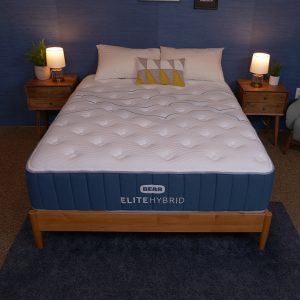

Key product features
What you should know
The Bear Elite Hybrid combines contouring foams and zoned support coils that balance cushioning with an uplifted feel. The mattress comes in three firmness options, and our testers found the Medium a great fit for a range of sleep styles.
- Our team reports that the Bear Elite Hybrid is supremely comfortable for back sleeping and can nicely accommodate stomach sleepers as well.
- The non-sale price of $2,305 for a queen puts the Elite Hybrid on the higher end of the price spectrum, but promotions and sales bring it down to the mid-range.
- The mattress features copper-infused memory foam to help minimize heat retention, while an optional $200 cooling cover upgrade incorporates phase-change material for active cooling.
- The memory foam layer may offer excellent pressure relief for those seeking an orthopedic mattress to ease joint and back pain.
Why we like the Bear Elite Hybrid as best for back sleepers
Back sleeping, particularly with a small pillow placed beneath the knees, is one of the recommended sleeping positions for relaxing back muscles. (6) While some people find that sleeping on their backs helps ease back and neck pain, others find it worsens these conditions. (7) The Bear Elite Hybrid may be what back sleepers need—especially those with joint and back pain looking for an orthopedic mattress.
The premium innerspring hybrid combines contouring memory foam layers with a five-zone support coil system, which means higher-gauge coils in the center and lighter-gauge coils around delicate pressure points. Our team (who tested the medium firmness model) says the Elite Hybrid offers impressive spinal support and notes that most body types and sleeping positions should feel comfortable. As for pressure relief, it may be a standout for both side and back sleepers, according to our testing. Between the two features, the Elite Hybrid serves as a great match for those on the hunt for an orthopedic mattress.
The mattress’ memory foam is infused with copper, which helps dissipate body heat. Our team found the mattress stayed cool and comfortable, but hot sleepers can opt for the CELLIANT® cover. According to the brand, it’s a $200 upgrade, but it’s made with phase-change material that converts body heat into energy waves for better recovery.
The mattress excelled in other areas, too, from excellent edge support to impressive motion isolation. Because the Elite Hybrid traps motion at the source to reduce movement across the mattress, our testers recommend it for couples. The mattress even scored well for responsiveness—back sleepers who wind up on their sides at night shouldn’t find it too difficult to change positions.
All in all, the Bear Elite Hybrid checks all the boxes for lumbar support and potential pressure relief. The choice of firmness means this mattress should work quite well for sleepers in all weight ranges on the hunt for a quality orthopedic mattress. Remember that premium materials and upgraded construction come at a premium. A queen-size Elite Hybrid is $2,305 (and doesn’t include the upgraded cover), which is high for mattresses. Fortunately, sales pricing makes the mattress more accessible to a wider range of shoppers.
See our complete Bear Elite Hybrid mattress review for more insights. Or, check out the best mattresses for back sleepers for more great options that will support your sleeping habits.
Specs
| Price (queen) | $2,305 |
| Material | Hybrid (foam and coils) |
| Firmness | Soft, Medium, Firm |
| Warranty | Lifetime |
| Trial | 120 nights |
Best orthopedic mattress for stomach sleepers: Saatva Classic
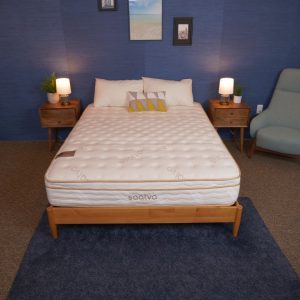

Key product features
What you should know
The Saatva Classic is a bestselling luxury innerspring thanks partly to its patented lumbar support and luxurious Euro pillow top. With a plush and comfortable feel, this chiropractor-recommended mattress may be an excellent fit for those with back and joint pain.
- Our testers appreciated the Classic’s subtle body contouring and zoned support, immediately easing back pain.
- This mattress is on the more expensive side, at $2,095 for a queen, though free white-glove delivery, setup, and old mattress removal are included with every order.
- With a choice of firmness and height, the Classic can work for most sleepers. Depending on their body type, we recommend the Firm and Luxury Firm for stomach sleepers.
- The springy mattress responds quickly, making it an excellent option for combination sleepers.
Why we like the Saatva Classic as best for stomach sleepers
Stomach sleeping isn’t generally recommended—nor is it particularly popular, with most people spending less than 10% of their time sleeping prone. (8) That’s likely because it can increase the risk of back, neck, and shoulder pain. (9) But for those who can’t quit the position, the best mattresses tend to be firmer, with enough support to properly elevate the hips for proper spinal alignment. (3) With its durable dual-coil design and patented lumbar features, the Saatva Classic is a great option for stomach sleepers looking to ease joint and back pain with an orthopedic mattress.
Our testers reviewed the bestselling Luxury Firm model and found the Euro pillow top very plush and comfortable, with noticeable support and pressure relief. That’s thanks to the coil-on-coil construction, which contours to the body’s curves to ease pressure, and the increased support in the center third of the mattress—two key factors in any orthopedic mattress. A high-density memory foam lumbar crown and spinal wire help ensure proper spinal support in any sleep position. Our team found that the mattress keeps the body lifted and supported for stomach sleepers, particularly with proper spinal alignment. The Saatva Classic is chiropractor-approved for back support. (10)
Our testers gave the mattress full marks for features like edge support and responsiveness, making it great for couples and combination sleepers. While it lacks any active cooling upgrades, our team says the Classic is quite airy and plush. The dual coil layers promote airflow as well, minimizing heat retention.
The single drawback to the Saatva Classic is its moderate motion transfer, which is to be somewhat expected from an innerspring. It’s a great pick for a quality orthopedic mattress, particularly for stomach sleepers. Just be mindful that the $2,095 price tag for a queen puts this mattress into the luxury category, and it’s best to time your purchase to annual sales if you’re trying to keep costs down. On the plus side, the mattress comes with free white-glove delivery, setup, mattress removal, a 365-night trial, and a lifetime warranty.
To learn more about stomach sleeping, visit our full guide on the best mattresses for stomach sleepers. Or, check out our comprehensive Saatva mattress review for more insights.
Specs
| Price (queen) | $2,095 |
| Material | Hybrid (foam and coils) |
| Firmness | Plush Soft, Luxury-Firm, Firm |
| Warranty | 365 nights |
| Trial | Lifetime |
How we test mattresses
Our mattress reviews are based on our team’s hands-on testing, evidence-based research, and medical professionals’ insight and in addition to Dr. Dasgupta, Dr. Kushagra Verma, a board-certified orthopedic spine surgeon at DISC Sports & Spine Center, shared his expertise on the benefits of orthopedic mattresses. With their insights guiding our process, our team evaluated every mattress on this list based on key specifications that affect spinal support and pressure relief while also considering factors like firmness, trial windows, and warranties. Read our full mattress testing methodology for more information.
Performance (sleep experience)—30%
A high-quality mattress should feel like it’s designed to provide you with the best sleep of your life. They should also deliver on the promise of a great sleep experience. Our sleep science coaches assess various factors to reflect the functional aspects of the mattress as well as the user’s sleep experience. Here’s what we’re looking for:
- Temperature regulation
- Motion isolation
- Edge support
- Technology
Comfort and support—30%
Alongside the sleep experience, comfort and support are just as important for a healthy and restful sleep. A high-quality mattress should assist in providing relief with certain aches and pains a user may experience when sleeping. It should also help users wake up feeling energized and rested. Here’s what we’re looking for:
- Firmness
- Pressure relief
- Spinal alignment support
- Customization
Value—20%
Assessing value involves a meticulous examination of several key factors that contribute to a mattress’s worth. A mattress that is priced just within reach of its target audience, yet surpasses competitors in terms of materials, performance, and support, presents a compelling value proposition. However value is not solely determined by the lowest price point. We also determine it by finding the balance between cost and the tangible benefits a mattress provides.
Customer experience—10%
Sometimes, the mattress can be great, but if the overall shopping experience wasn’t, that could easily put a sour taste in a user’s mouth about the mattress they just purchased. We put in the hours to determine how well the entire process of buying a mattress matches users’ expectations and what options are available when something goes wrong.
- Shipping
- Warranty
- Customer service
- Sleep trial
Health and safety—10%
It’s important to understand that a mattress is more than just a sleeping surface—it’s an environment where you spend a significant portion of your life. We meticulously assess critical aspects of mattresses that may directly impact your well-being and peace of mind.
Our factors in this rating include:
- Hypoallergenic materials
- Off-gassing and chemical exposure
- Safety certifications
How to choose the best orthopedic mattress
An orthopedic mattress should be supportive enough to maintain a neutral spine, regardless of your body type and sleep style, while cushioning the joints to prevent pressure from building. Look for mattresses with zoned support, which ensures more support in areas of deeper compression to support the spine. Pressure-relieving materials, like memory and latex, are also good choices.
Orthopedic mattresses typically have a medium-firm-to-firm feel, but remember that body type and sleep style can affect how soft or firm a mattress feels. The heavier you are, the more you sink into a bed and the softer it feels. Conversely, lightweight sleepers often find mattresses feel firmer than advertised because they lack the weight necessary to compress the top layers. While average-weight sleepers can generally expect a manufacturer’s firmness rating to be fairly accurate, that’s not always the case for people in higher or lower weight ranges. They should factor in their body types when choosing an appropriate firmness in an orthopedic mattress.
Your preferred sleep position can also steer you toward the best firmness for your needs. While back and stomach sleepers need firmer support to keep the back supported and the hips elevated, side sleepers benefit from a slightly softer mattress to ensure enough cushioning around the hips and shoulders.
What is an orthopedic mattress?
The term “orthopedic mattress” is more of a marketing term than anything else since it doesn’t have a true medical definition. Verma states, “An orthopedic mattress is designed to support the spine and joints and is often firm or very firm.” However, he notes that firmness can vary depending on each patient’s preferences. He says that orthopedic mattresses are also typically made with materials that relieve pressure and provide upgraded lumbar support to keep the spine from going into a state of flexion. You may also see a mattress described as “ergonomic,” which is sometimes used synonymously with orthopedic.
Types of orthopedic mattresses
Orthopedic mattresses are generally characterized by their ability to support the spine and relieve pressure to ease joint pain. You can find that in both all-foam and hybrid mattresses. Many orthopedic mattresses are made with memory foam or latex because they are known for their impressive pressure-relieving properties. Memory foam mattresses hug the body closely and contour to the spine, which helps eliminate pressure spots. Just be aware that the material is prone to trapping heat, which can be problematic for hot sleepers. Latex mattresses, on the other hand, sleep temperature-neutral and offer more durability than memory foam. This material has a more buoyant sensation, so it’s more responsive. But that can translate to motion transfer, an issue for couples.
Hybrid mattresses tend to offer more support than their all-foam counterparts, but you can find foam mattresses that offer zoned support as well. Body weight can indicate whether an orthopedic mattress with an all-foam or hybrid construction is a better option for you. Heavier sleepers are generally best served by hybrid models because the coil layers are more resilient and durable, which means better long-term performance.
Who should consider an orthopedic mattress?
“Orthopedic mattresses can help if you have back, neck, or joint pain,” says Dr. Dasgupta. The same is true for people with poor posture, spinal issues like scoliosis or herniated discs, and those who’ve had spinal surgery, he says.
Arguably, most sleepers benefit from an orthopedic mattress because the qualities that typically characterize them—specifically, enhanced support to align the spine and excellent pressure relief—are essential features for everyone. Regardless of age or physical condition, a mattress that helps maintain a neutral spine and evenly distributes body weight to ease pressure point pain is important. For those with existing orthopedic issues, like joint or back pain, it’s wise to look for a mattress marketed as orthopedic and double-check that it ticks all the necessary boxes, from material quality and construction to upgrades like cooling features. It’s also best to consult with your doctor if you’re looking to address specific symptoms—they may be able to offer suggestions for appropriate sleeping positions and accessories.
FAQs
Are orthopedic mattresses recommended by doctors?
Healthcare providers and sleep specialists often recommend orthopedic mattresses for people with chronic pain, such as back and joint issues. These mattresses are designed to ease pressure and support the spine, which can help reduce pain and improve sleep quality. Still, it’s important to speak with your doctor about your specific needs.
Do orthopedic mattresses help with body pain?
Orthopedic mattresses can help reduce body pain by offering enhanced lumbar support to maintain a properly aligned spine and cushion the joints. Materials that distribute body weight evenly, like memory foam and latex, help relieve pressure on joints, while the firmer support found in orthopedic mattresses helps keep the spine straight.
What is the best thickness for an orthopedic mattress?
The ideal thickness of an orthopedic mattress is variable, but 8 to 12 inches is usually sufficient for the right balance of comfort and support. Be mindful of body weight as you consider an appropriate mattress height. Heavyweight sleepers tend to sink more deeply into a mattress, and a thinner mattress may not have the most suitable support. Lightweight sleepers, on the other hand, don’t tend to compress the mattress layers much, so a thinner mattress isn’t necessarily an issue.
Our experts
Dr. Swathi Varanasi
Dr. Swathi Varanasi, or Dr. Swathi for short, is a pharmacist passionate about the intersection of personalized medicine and innovation. Dr. Swathi received her Doctor of Pharmacy (PharmD) at the Medical University of South Carolina and Bachelor of Arts (BA) at Carleton College. She co-founded and was the first-ever healthcare professional in the US to complete postdoctoral residency training in integrative medicine and preventative health. She also completed a postdoctoral fellowship in Medical Affairs in biotech and has training in nutrition from Cornell University.
Krista Manning
Krista Manning is an accomplished medical copy editor and fact-checker who stands out in the pharmaceutical, health, and wellness domains. With a meticulous eye for detail and a command of medical language, Krista ensures the accuracy and clarity of content. Beyond her professional expertise, Krista is an advocate for mental health awareness. Recognizing the crucial intersection of psychological and physical well-being, she actively contributes to projects that promote mental health awareness within the healthcare narrative. Krista’s commitment extends beyond the pages she edits, emphasizing the holistic nature of health communication.

Jessica Timmons
Fortune Recommends Sleep Writer
About Author
Jessica Timmons is a freelance writer who has written extensively about health, wellness, fitness, sleep, beauty, and parenting, among other topics. Her work has appeared on Forbes, Healthline, mindbodygreen, Everyday Health, and more. When she’s not writing, she enjoys spending time with her husband and four active kids, lifting weights, and getting better at rock climbing one route at a time.
